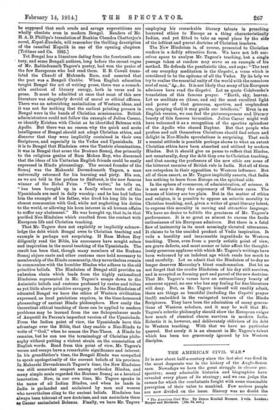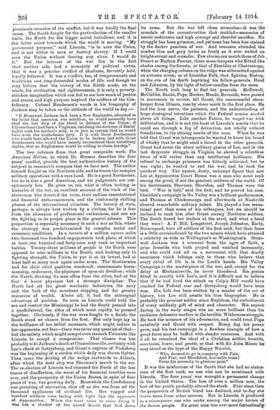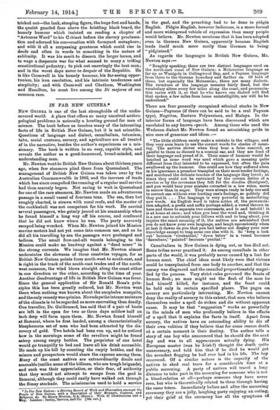THE AMERICAN CIVIL WAR.* Ix is now about half-a-century since
the last allot was fired in the most desperate war in the history of the Anglo-Saxon race. Nowadays we have the great struggle in clearer per- spective; many admirable histories and biographies have revealed every phase of its strategy ; and we can judge the canoes for which the combatants fought with some reasonable perception of their value to mankind. Few serious people are now divided on the issue. Slavery was no doubt the
• The American Civil War. By James Kendall Roamer. S eels. Lo.doa Homer and Brothers. [12s. 6d. set.]
proximate occasion of the conflict, but it was hardly the final Cause. The South fought for the particularism of the smaller Units, the North for the bigger social battalions, and it is the latter creed towards which the world is moving. "My paramount propose," said Lincoln, "is to save the Union, and is not either to save or destroy slavery. If I could save the Union without freeing any slave, I would do it." But the interest of the war lies in the fact that neither side had a monopoly of political virtue, that it was a genuine conflict of idealisms, fervently held, loyally followed. It was a conflict, too, of temperaments and traditions and long-descended modes of life, and though we may believe that the victory of the North- made, on the whole, for civilization and righteousness, it is only a poverty- stricken imagination which can fall to see how much of justice and reason and high purpose inspired the soldiers of the Con- federacy. Colonel Henderson's' words in his biography of Jackson may be taken as the attitude of the world to-day
" If Stonewall Jackson had been a New Englander, educated in the belief that secession was rebellion, he would assuredly have shed the last drop of his blood in defence of the Union; if Ulysses Grout had been a Virginian, imbibing the doctrine of States rights with his mother's milk, it is just as certain that he would have worn the Confederate grey. It is with those Northerners who would have allowed the Union to be broken, and with th ose Southerners who would have tamely surrendered their hereditary rights, that no Englishman would be willing to claim kinship."
The two volumes from that great composite work, The American Nation, in which Dr. Homer describes the four years' conflict, provide the best authoritative history of the subject in reasonable compass that we have met. The author himself fought on the Northern side, and he traces the complex military operations with a sure hand. He is a good Northerner, but he is also a good American, and his judgments are con- spicuously fair. He gives us, too, what is often lacking in histories of the war, an excellent account of the work of the statesmen who directed the helm, their endless constitutional and financial embarrassments, and the continually shifting phases of the international situation. The history of wars, perhaps, is always best written by a civilian, for he is free from the obsession of professional enthusiasm, and can see the fighting in its proper place in the general scheme. This proportion is especially necessary in such a war as this, where the strategy was predetermined by complex social and economic conditions. In a terrain of a million square miles two thousand two hundred engagements took place, of which at least one hundred and forty-nine may rank as important battles. Twenty-three millions of people in the North were opposed to nine millions in the South, and, looking only to fighting strength, the Union, to put it at its lowest, had at least half as many men again under arms. The Southerners had for their chief qualities woodcraft, consummate horse- manship, endurance, the physique of open-air dwellers; while the North, drawing its men often from the cities, had at the first a lesser physique but a stronger discipline. The North bad all the great mechanic industries, the navy and the bulk of the merchant shipping, and far greater resources of wealth. Above all, it bad the strategical advantage of position. So soon as Lincoln could hold the sea and control the Mississippi he had the South penned into a quadrilateral, the sides of which must rapidly be pressed together. Obviously, if the war were fought to a finish, the South stood no chance from the first. Her only hope lay in the brilliance of her initial successes, which might induce in her opponents, not fear—there was never any question of that— but the satiety which might compel even staunch Unionists like Lincoln to accept a compromise. That chance was lost probably with Jackson's death atChancellorsville, certainly with Lee's check at Gettysburg, and Grant's capture of Vicksburg was the beginning of a cordon which daily was drawn tighter. Then came the driving of the wedge eastwards to Atlanta, after which the next step was Sherman's march to the sea. The re-election of Lincoln had cleansed the North of the last traces of disaffection, the worst of his financial troubles were over, and the prosperity of the Union States, in spite of four years of war, was growing daily. Meanwhile the Confederacy was perishing of starvation, shut off as she was from all the thousand appliances of civilized life. Her ragged and barefoot soldiers were facing with tight lips the approach of Appomattox. When the hour came to cease firing it was but a shadow of the proud South that laid down its arms. But the war left clean memories—it was the scandals of the reconstruction that rankled—memories of heroic endurance and high courage and cheerful sacrifice. No struggle has been grimmer, and yet none has been less stained by the darker passions of war. And romance attended the sombre blue and grey levies as freely as it ever waited on knight-errant and crusader. Few stories can match those of Jeb Stuart or Nathan Forrest, those moss-trooper', who flitted like shades among the forests; or that of Sheridan at Chattanooga, when the charging column on the ridge was silhouetted against an autumn moon; or of Leonidas Polk, that fighting Bishop, on the eve of his death baptizing his fellow-generals, Hood and Johnston, by the light of tallow-candles from the mess.
The North took long to find her generals. McDowell, McClellan, Banks, Pope, Hooker, Meade, Burnside, were passed in succession in review, till Grant, the unsuccessful store- keeper from Illinois, rose by sheer merit to the first place. He had the iron nerve, the patience, and the understanding of large strategical intentions which the Federal armies needed above all things. Like another Fabius, be waged war with deliberation, and it is not the least of Lincoln's merits that he could see through a fog of detraction, not wholly without foundation, to the shining merits of the man. When he was told that Grant was intemperate be wanted to know his brand of whisky that he might send a barrel to the other generale. Grant had never the sheer military genius of Lee, and in the last desperate straggle in Virginia he showed a relentless force of will rather than any intellectual brilliance. His refusal to exchange prisoners was bitterly criticized, but he was right ; be wanted to end the war, and he took the quickest way. The square, dusty, unkempt figure that met Lee at Appomattox Court House was a man who must rank among the great, if not the greatest, soldiers of the world. Of his lieutenants, Sherman, Sheridan, and Thomas were the best. " War is hell," said the first, and he proved his case. Sheridan's campaign in the Valley was a brilliant performance, and Thomas at Chickamauga and afterwards at Nashville showed remarkable military talent. He played a less sensa- tional part than some of his colleagues, but we should be inclined to rank him after Grant among Northern soldiers. The South found her leaders at the start, and what a band they were ! A. P. Hill, Longstreet, Joseph Johnston, Early, Beauregard, were all soldiers of the fast rank, but their fame is a little overshadowed by the two names which have attained a celebrity as wide as Wellington's or Washington's. Stone- wall Jackson was a remnant from the ages of faith, a grim Ironaide who both prayed and watched incessantly, and who could risk all on a movement with that deadly assurance which belongs only to those who believe that every detail of life is in the Lord's bands. His Valley Campaign is the masterpiece of the war, and, except for the delay at Mechanicsville, be never blundered. His genius fitted in exactly with Lee's, and it is difficult not to believe that if he had lived the attack on Culp's Hill would have reached the Federal rear and Gettysburg would have been won. His Life has been written by a master of the art of history, but Lee still awaits his true biographer. He is probably the greatest soldier since Napoleon, the embodiment of every soldierly gift of mind and character. His superb daring in the early stages was no more brilliant than his stubborn defensive warfare in the terrible Wilderness struggle. He took the measure of his adversaries, and could treat Pope cavalierly and Grant with respect Every day his power grew, and his last campaign is a flawless example of how a great force may be baffled with slender resources. And with it all he remained the ideal of a Christian soldier, humble, courteous, brave, and gentle, so that with Sir John Moore ha may stand as the type of the Happy Warrior, " Who, doomed to go in company with Pain, And Fear, and Bloodshed, miserable trainI Turns his necessity to glorious gain."
It was the misfortune of the South that she bad no states. men of the first rank, no one who can be mentioned with Lincoln. The four years' war wrought a permanent change in the United States. The loss of over a million men, the best of her youth, probably altered the stock. Ever since then the proportion of British blood has declined, and to-day she draws more from other sources. But in Lincoln it produced- as a recompense one who ranks among the major heroes of the Saxon people. No great man was ever more fantasticidl*'
tricked out—the lank, stooping figure, the huge feet and hands, the quaint gnarled face above the bristling black beard, the homely humour which insisted on reading a chapter of "Artemus Ward" to his Cabinet before the slavery proclama- tion and adorned his conversation with farmyard metaphors ; and with it all a surpassing greatness which could rise in deeds and often in words to something in the nature of sublimity. It was his merit to discern the larger issues, and to wage a desperate war for what seemed to many a trifling constitutional pedantry; to pick out unerringly the best men; and in the worst days never to despair of the Republic. He is like Cromwell in his homely humour, his far-seeing oppor- tunism, his iron resolution, and his intrinsic, tenderness and simplicity; and with Cromwell and Chatham, Washington and Hamilton, he must live among the Di majores of our common race.








































 Previous page
Previous page